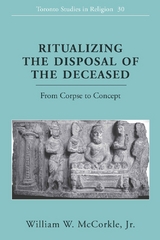Ritualizing the Disposal of the Deceased
From Corpse to Concept
Seiten
2010
|
New edition
Peter Lang Publishing Inc (Verlag)
978-1-4331-1010-8 (ISBN)
Peter Lang Publishing Inc (Verlag)
978-1-4331-1010-8 (ISBN)
- Titel z.Zt. nicht lieferbar
- Versandkostenfrei innerhalb Deutschlands
- Auch auf Rechnung
- Verfügbarkeit in der Filiale vor Ort prüfen
- Artikel merken
Traces mortuary behavior from the early fossil record to modern religious contexts in diverse cultural settings. In this book, by using archival and ethnographic evidence from Buddhist traditions, the author offers the disparity between doctrines that contradict actual practices performed by Buddhists themselves.
Ritualizing the Disposal of the Deceased traces mortuary behavior from the early fossil record to modern religious contexts in diverse cultural settings. By using archival and ethnographic evidence from Buddhist traditions, the author highlights the disparity between doctrines that contradict actual practices performed by Buddhists themselves. By appealing to the evolved cognitive architecture of human minds, this book argues that ritualized disposal behavior is the by-product of mental systems designed to handle living people. Due to complex social intelligence, humans are compelled to handle dead people in ritualized behaviors and to represent them in counterintuitive ways. The author also examines the professional religious guilds that have taken advantage of these ritualized compulsions over the last several thousand years, by giving and controlling the meanings behind these actions. Furthermore, experimental evidence is given to support this hypothesis, providing the first mature cognitive and evolutionary theory for mortuary behavior by humans.
Ritualizing the Disposal of the Deceased traces mortuary behavior from the early fossil record to modern religious contexts in diverse cultural settings. By using archival and ethnographic evidence from Buddhist traditions, the author highlights the disparity between doctrines that contradict actual practices performed by Buddhists themselves. By appealing to the evolved cognitive architecture of human minds, this book argues that ritualized disposal behavior is the by-product of mental systems designed to handle living people. Due to complex social intelligence, humans are compelled to handle dead people in ritualized behaviors and to represent them in counterintuitive ways. The author also examines the professional religious guilds that have taken advantage of these ritualized compulsions over the last several thousand years, by giving and controlling the meanings behind these actions. Furthermore, experimental evidence is given to support this hypothesis, providing the first mature cognitive and evolutionary theory for mortuary behavior by humans.
The Author: William W. McCorkle, Jr. is an evolutionary and cognitive anthropologist interested in ritual, language, and communication. He earned his Ph.D. from the Institute of Cognition and Culture at Queen’s University in Belfast, one of the world’s premiere centers for research on cognition, culture, and religion. He has conducted fieldwork in India and Japan and devised original experiments to test his theory on the ritualized burial of dead bodies by humans. He regularly gives papers and presentations internationally on ritual and human behavior. Most recently, he has served as Visiting Assistant Professor in the Department of Religious Studies at Webster University in St. Louis, Missouri.
| Erscheint lt. Verlag | 16.4.2010 |
|---|---|
| Reihe/Serie | Toronto Studies in Religion ; 30 | Toronto Studies in Religion ; 30 |
| Verlagsort | New York |
| Sprache | englisch |
| Maße | 160 x 230 mm |
| Gewicht | 300 g |
| Themenwelt | Geisteswissenschaften ► Psychologie ► Verhaltenstherapie |
| Geisteswissenschaften ► Religion / Theologie ► Buddhismus | |
| Geisteswissenschaften ► Religion / Theologie ► Christentum | |
| Sozialwissenschaften ► Soziologie ► Spezielle Soziologien | |
| Schlagworte | Hardcover, Softcover / Religion/Theologie |
| ISBN-10 | 1-4331-1010-5 / 1433110105 |
| ISBN-13 | 978-1-4331-1010-8 / 9781433110108 |
| Zustand | Neuware |
| Haben Sie eine Frage zum Produkt? |
Mehr entdecken
aus dem Bereich
aus dem Bereich
Verhaltensanalyse - Behandlungsplan - Bericht an den Gutachter
Buch | Softcover (2022)
Kohlhammer (Verlag)
35,00 €
Buch | Hardcover (2024)
Beltz (Verlag)
38,00 €




